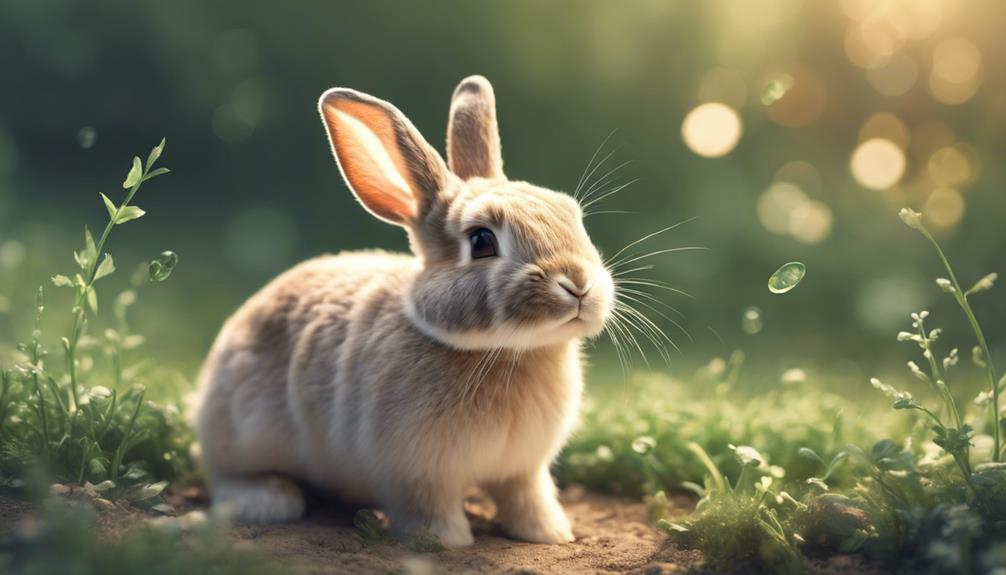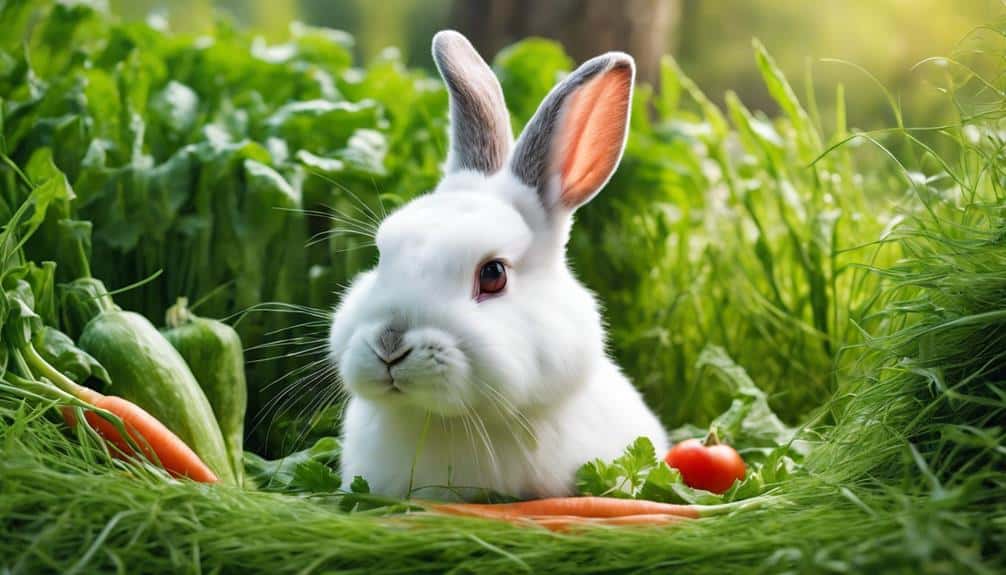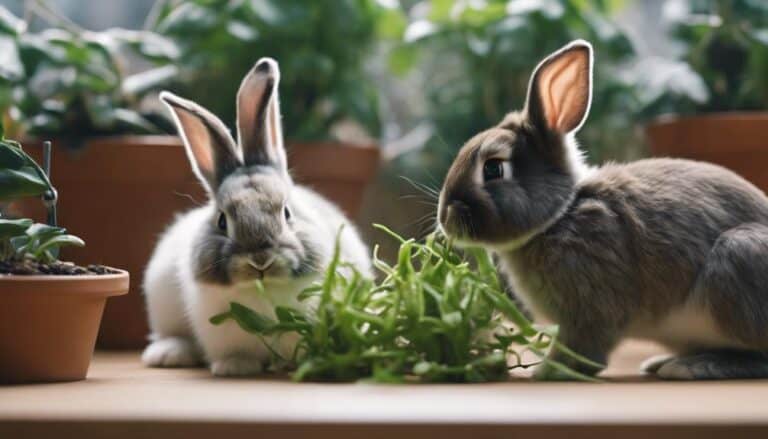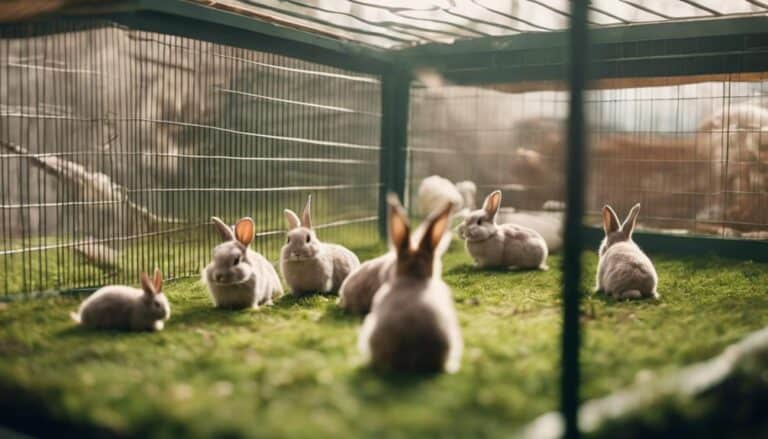If you're looking to increase bunny fertility, there are simple yet effective methods at your disposal. By implementing a few strategic practices, you can greatly enhance the reproductive potential of your rabbits.
From adjusting environmental conditions to utilizing specialized supplements, there are key steps you can take to boost fertility rates and improve breeding outcomes.
Stay tuned to discover the secrets behind maximizing bunny fertility and ensuring successful breeding endeavors.
Contents
- 1 Key Takeaways
- 2 Factors Affecting Bunny Fertility
- 3 Importance of Ambient Temperature
- 4 Impact of Light Day Length
- 5 Significance of Nutrition for Fertility
- 6 Strategies for Enhancing Female Breeding
- 7 Recommended Rabbit Reproduction Practices
- 8 Supporting Products for Bunny Fertility
- 9 Frequently Asked Questions
- 10 Conclusion
Key Takeaways
- Maintain ideal ambient temperature for optimal fertility.
- Include Moringa leaves in the diet to enhance reproductive health.
- Provide a well-balanced diet with necessary supplements for breeding success.
- Monitor and optimize female breeding conditions for successful outcomes.
Factors Affecting Bunny Fertility

Ambient temperature greatly influences bunny fertility, impacting conception rates under both low and high temperature conditions. Another critical factor in boosting bunny fertility is the inclusion of Moringa leaves in their diet. These leaves are rich in essential nutrients like vitamins A, B, and C, as well as minerals such as calcium and potassium, all of which are vital for reproductive health in bunnies. Studies have shown that incorporating Moringa leaves into the diet of breeding rabbits can greatly improve their overall fertility rates.
In addition to the impact of ambient temperature and the inclusion of Moringa leaves, providing a well-balanced diet that meets the nutritional needs of bunnies is essential for maximizing fertility. Ensuring that rabbits have access to complete compound feed and natural vitamin supplements can help support their reproductive health. By focusing on these factors, such as ambient temperature regulation, Moringa leaf consumption, and proper nutrition, you can effectively enhance bunny fertility and increase the chances of successful breeding outcomes.
Importance of Ambient Temperature
Maintaining the ideal temperature range of 14 to 16 degrees Celsius is essential for maximizing bunny fertility and breeding success. Ambient temperature plays a vital role in the reproductive performance of rabbits. Both low and high temperatures can negatively impact conception rates. Extreme temperatures outside the best range can lead to decreased mating activity and reduced reproductive success in bunnies.
Temperature fluctuations have been shown to disrupt hormone levels in rabbits, affecting important processes like ovulation and sperm production. Proper temperature control within breeding facilities is paramount to make sure that environmental conditions are conducive to the best bunny fertility. By regulating ambient temperature within the recommended range, you can greatly improve the chances of successful breeding and enhance overall reproductive outcomes in rabbits.
Impact of Light Day Length

To optimize bunny fertility, ensuring rabbits receive 14 to 16 hours of light per day is important for their breeding success. Light day length plays a significant role in the reproductive capabilities of rabbits. Research indicates that light exposure directly impacts the breeding cycle and fertility rates of rabbits.
Insufficient light can disrupt the reproductive process, leading to irregularities in ovulation and mating behavior. Proper lighting duration is essential for regulating the hormonal balance necessary for successful breeding in rabbits. By maintaining a consistent light exposure within the recommended range, breeders can effectively synchronize the breeding cycles of their rabbits.
This synchronization maximizes the chances of successful mating and conception, ultimately boosting overall fertility rates. Paying close attention to the light day length for rabbits is a key factor in ensuring their reproductive health and increasing the likelihood of successful breeding outcomes.
Significance of Nutrition for Fertility
Proper nutrition greatly contributes to boosting bunny fertility by ensuring prime body condition and reproductive health. Nutrition plays a pivotal role in the overall reproductive success of rabbits.
Providing complete compound feed along with natural vitamin supplements can greatly enhance fertility rates in bunnies. A balanced diet is essential for maintaining ideal body weight and health, which in turn improves breeding outcomes and enhances bunny fertility.
It's vital to address any vitamin deficiencies or imbalances that can hinder fertility in rabbits. By focusing on nutrition, you can optimize the chances of successful breeding and guarantee the well-being of your bunnies.
Strategies for Enhancing Female Breeding

Monitor the external genitals of your female rabbits to pinpoint the best time for mating and increase fertility.
Guarantee that your rabbits are in top physical condition by preventing obesity, hunger, and health issues to support successful breeding.
Provide a well-balanced diet and necessary supplements to maintain ovulation, hormone balance, and manage stress levels for enhanced female rabbit breeding.
Diet for Ovulation
For perfect fertility and successful ovulation in female rabbits, make sure their diet is rich in essential nutrients such as proteins, vitamins, and minerals. High-quality hay, fresh vegetables, and balanced commercial rabbit feed are essential for the best nutrition during the breeding period.
Including natural supplements like flax seeds or black oil sunflower seeds can enhance female rabbit fertility and support successful ovulation. It's important to avoid both overfeeding and underfeeding female rabbits to maintain a healthy body condition, which is important for breeding success.
Consulting a veterinarian or rabbit breeding specialist can help create a customized diet plan tailored to your female rabbits' specific reproductive needs and goals. Prioritizing a nutrient-rich diet is key to promoting fertility and ensuring successful ovulation in female rabbits.
Hormone Balance Importance
To optimize female rabbit breeding success, ensuring a vital balance of hormones like estrogen and progesterone is paramount. These hormones are essential for regulating the reproductive cycle of female rabbits and are directly linked to female rabbit fertility. Imbalances in estrogen and progesterone levels can result in irregular estrus cycles, reduced fertility, and potential complications during pregnancy.
Monitoring hormone levels in female rabbits is essential to identify any deficiencies or excesses that may be impacting their breeding capabilities. Consulting with a veterinarian for hormone testing and management can help address any imbalances and improve breeding outcomes in female rabbits.
Stress Management Techniques
Implementing stress management techniques is important for enhancing female rabbit breeding success.
To optimize breeding rabbits, maintain a consistent mating schedule to reduce stress and anxiety levels.
Create a serene breeding environment by minimizing noise and disturbances to promote successful mating outcomes.
Guarantee proper nutrition and access to clean water to support female rabbit health and reproductive functions.
Facilitate regular exercise opportunities for female rabbits to decrease stress and uphold ideal breeding conditions.
Avoid overcrowding in rabbit housing to prevent stress-related fertility issues and ensure successful breeding outcomes.
Recommended Rabbit Reproduction Practices

How can monitoring the condition of female rabbits' external genitals aid in determining the best time for mating? Female rabbits exhibit physical changes in their external genitals when they're ready to mate, making it important to observe these signs for the best breeding timing.
Ensuring proper nutrition is fundamental for female rabbits to be in prime breeding condition. A well-balanced diet supports fertility and successful reproduction. Additionally, maintaining the right balance of light exposure and darkness is important for breeding success, with 14 to 16 hours of light per day being ideal.
Female rabbits should also be kept at a healthy weight to support their natural reproductive processes. Obesity or being underweight can hinder fertility. Providing adequate breeding equipment and suitable housing is essential for creating a conducive environment for successful rabbit breeding practices.
Supporting Products for Bunny Fertility
Monitoring the condition of female rabbits' external genitals plays an important role in determining the ideal time for mating. This can be further supported by utilizing specific products to enhance bunny fertility.
To enhance reproductive performance, consider incorporating Rabbit Gold Forte, a premium feed mix tailored for gestating and breastfeeding female rabbits. This feed promotes fast growth, increased meat content, and overall health, essential for successful breeding.
Additionally, supplements like Flax seeds, Black Oil Sunflower Seeds, and Calf Manna are beneficial for improving body condition, enhancing coat condition, and increasing fertility in rabbits. Adequate feeding of these supplements not only aids in recovery from molts but also improves general condition and supports reproductive health, essential for ideal reproductive performance.
Safety precautions, such as checking with the manufacturer, researching safe feeding amounts, and monitoring rabbit reactions, are crucial to avoid overfeeding and potential harm.
Popular supplements like Apple Cider Vinegar (ACV), Dried papaya, and Immunize can provide immune system support and enhance overall health in rabbits, contributing positively to their reproductive performance.
Frequently Asked Questions
How Can I Increase My Rabbits Fertility?
To increase your rabbit's fertility, consider fertility supplements. Monitor mating timing, provide proper nutrition, guarantee ideal light exposure, regulate ambient temperature, and use suitable breeding equipment and housing. These steps can enhance breeding success in rabbits.
What Causes Infertility in Rabbits?
Nutritional deficiencies can cause infertility in rabbits, affecting their reproductive health. Lack of essential nutrients like vitamins and minerals can disrupt the delicate balance needed for successful breeding. Ensuring a balanced diet is essential.
How Do I Encourage My Rabbits to Breed?
Encouraging breeding behavior in rabbits involves monitoring genital condition, ensuring health, timing mating correctly, and considering multiple does for fostering. Check physical well-being and disease status beforehand. Boost fertility by following these steps for successful breeding.
Why Won't My Female Rabbit Get Pregnant?
Guarantee your female rabbit's diet meets nutritional needs to avoid deficiencies impacting fertility. Address underlying health issues with a vet. Monitor heat cycles, mating conditions, and environmental factors. Healthy habits can increase chances of successful pregnancy.
Conclusion
In summary, ensuring ideal conditions for bunny fertility is essential for successful breeding outcomes.
By maintaining proper temperature, light exposure, nutrition, and female rabbit health, breeders can enhance their chances of successful reproduction.
Utilizing recommended breeding practices and supplements like Rabbit Gold Forte can further support fertility.
Remember, staying proactive and informed is key to achieving bunny baby boom!






